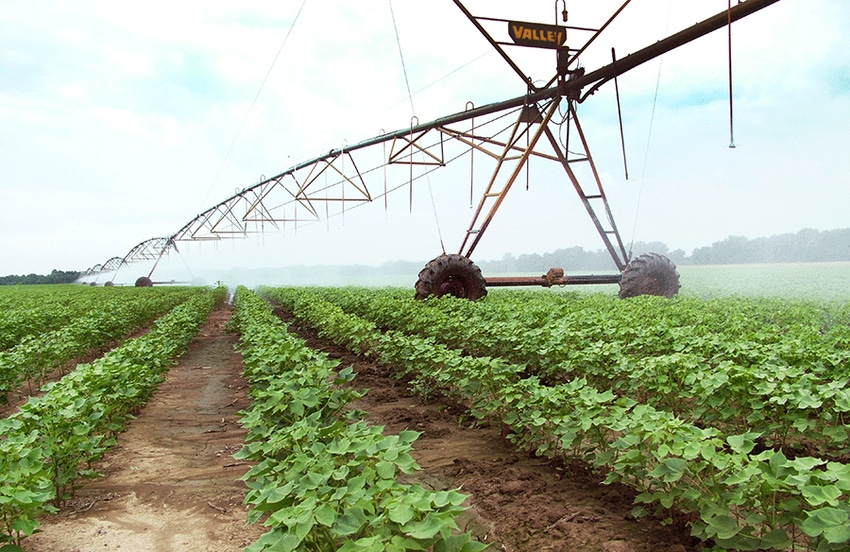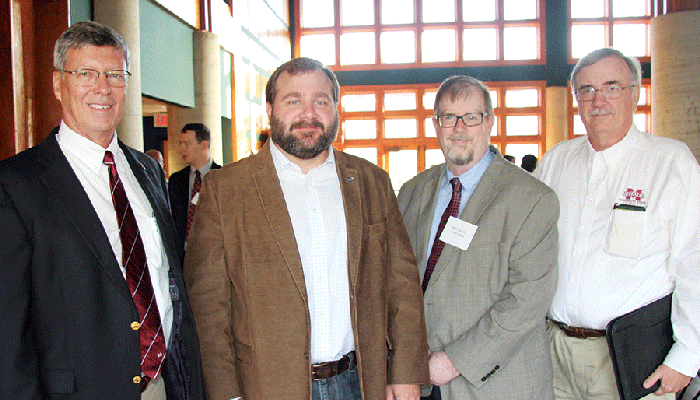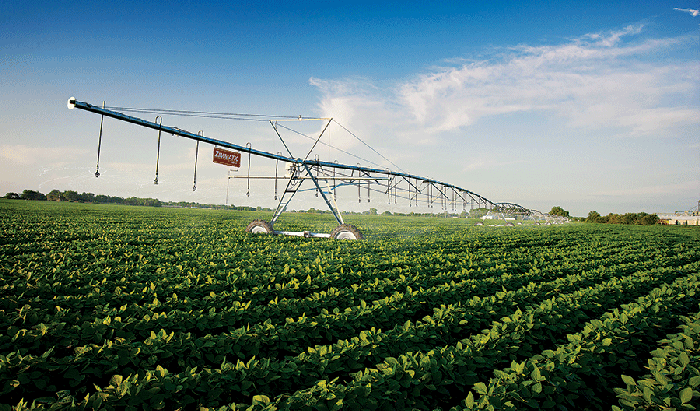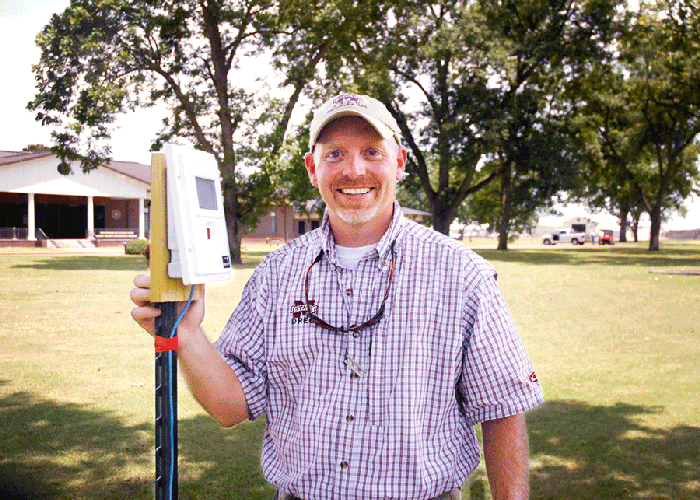
The money’s now in the bank for a new Delta regional water center, to be located at Stoneville, Miss. The multi-disciplinary, multi-institutional facility will be jointly operated by the USDA Agricultural Research Service and Mississippi State University, and will focus on water issues specific to the Delta region.
"We're really excited that funding came through about three weeks ago, and that we can get moving on this effort," Dr. Jeff Johnson, head of the Delta Research and Extension Center at Stoneville, said at the annual meeting of the Mississippi Agricultural Economics Association at Mississippi State University. "We're already in the process of searching for faculty, and we've started renovations on a facility for offices and laboratory space."
As yet, no official name has been determined, he says. "For the time being, we're call it Delta Water Center, but one of the possibilities is Mississippi River Alluvial Aquifer Water Research Center, to better reflect the regional scope."
The need for such a center has been evident for some time, he says, as concerns have increased about a decline in the aquifer used for irrigation in the Mississippi Delta, and the need for increased research into irrigation management practices to increase efficiency and use less water for crops, while maintaining or boosting yields.
Dr. Jeff Johnson, from left, head of the Delta Research and Extension Center, Stoneville, Miss.; Walt Stephens, president of the Mississippi Agricultural Economics Association; Dr. Keith Coble, professor and head of the Mississippi State University Department of Agricultural Economics; and Dr. Larry Falconer, MSU Extension economist at Stoneville, were among those participating in the MAEA annual meeting.
“In 2014,” Johnson says, “we had a symposium of all USDA and university researchers in Mississippi, Louisiana, Arkansas, Tennessee, Missouri, and Alabama to talk about water issues — where are we, what are we doing, and where do we need to go? We met again in 2015 to develop a strategy for going forward. One part of that strategy was the need for a regional water research and Extension center, located in the Delta, to deal with Delta water issues.”
The facility will be patterned similar to the Warm Water Aquaculture Center at Stoneville, he says. “If a producer walks in the door with a water problem, he doesn’t care if it’s Mississippi State or USDA — he just wants his water issue solved. And our goal is to give him the help that’s needed, based on solid research and sound science.”
There will be 11 faculty positions, Johnson says, six ARS and five MSU, plus the research associates and technicians that support them. MSU faculty will include a natural resources economist, irrigation engineer, and agronomist, and ARS faculty will include an agricultural engineer, agronomist, and physiologist. Both organizations will also have support from staff already working on water issues.
Work will be focused on irrigation/agronomic practices, irrigation technology, hydrology, climatology, and economic impact, in collaboration with the Mississippi Department of Environmental Quality, U.S. Geological Survey, and U.S. Corps of Engineers.
“We’ve been very careful not to duplicate some of the positions and expertise in these other agencies,” Johnson says, “but rather to focus on the areas for which we have responsibility, and to link our efforts with these other organizations in order to develop a comprehensive water scenario for the Delta region.
“Three other areas in which we want to have some expertise is water policy, GIS (geographic information systems), and the social arena (surveys). We’re hoping that in our MSU faculty positions there will already be some of this expertise; for example, a natural resources economist may come with some water policy expertise, an engineer may come with some GIS expertise, etc.
Johnson, who came to the DREC position about four years ago, says he’d been working in Texas, where rainfall was only about 16 inches annually. “When this position came open, I told my wife, ‘In Mississippi, they measure their rainfall in feet!’ When I got here, one of the first people I met was Jason Krutz, who told me, ‘We’ve got water problems,’ so I felt right at home.”
Krutz, who was then MSU irrigation specialist at DREC, and is now director of the Mississippi Water Resources Research Institute, also at Stoneville, told the MAEA group “the problems we’re facing, looking forward, are interdisciplinary. While all these issues may be agronomically related, we need to think about working as an interdisciplinary team — agronomists, engineers, economists, etc. — all with the goal of helping producers of the state more efficiently use our water resources.
“If someone were to drop off a billion dollars today, I don’t think it would address all the water issues we have. The problems we have are going to require money, and there aren’t that many entities that are going to drop hundreds of thousands of dollars to help with these issues. I think we’re going to have to look for competitive funding. And we need to have people at the university who are willing and able to engage in programs dealing with the specific problems we have.”
For the past several months, Krutz says, “We’ve been looking through large federal entities to determine what kind of ideas and projects they are funding, what expertise we have at Mississippi State University, and how can we connect them.
“In the future, I think it will all be under the umbrella of ecosystems services: yield, water quality, water quantity, biodiversity, carbon, nitrogen, phosphorous, sediment/polluntant runoff — all these, and more, are connected as ecosystem services.”
Precision agriculture and big data will play a major role, he says. “In big data, we’re talking about soils data, climatic data, data sets of hybrid performance and fertility recommendations — robust, interconnected, economic analyses, multitudes of models connected together. In precision agriculture, we’re talking about precision planters, precision harvesting, precision pesticide application. Precision ag will allow us to reduce contaminants going into the environment — nutrients, pesticides, fertilizers. Precision irrigation — timing versus delivery, furrow irrigation versus pivot versus subsurface drip versus subsurface drainage; irrigation and pesticide/nutrient delivery — all these will be important.”
Other practices, Krutz says, may include inter-basin transfer, pumping water from smaller rivers and streams, transporting it by pipe, and reinjecting it into the aquifer. “I think this may be one of the most rapid solutions to the declining aquifer, but there are water quality issues to be considered; the last thing you want to do is inject contaminants into the aquifer.
“Weir systems on existing streams, and wastewater reclamation (a hot topic nationally and globally) may not see an immediate impact here, but are among the things we need to look into”.
Irrigation best management practices “are almost infinite as we incorporate new technologies into our production systems, and we need to look at agronomic practices such as cover crops, tillage, plant populations, etc., as well as water quality — contamination concerns, carbon/nitrogen/phosphorus/sediment transport and how they’re related to irrigation and agronomics. We’ve got to quantify the downstream impact of contaminants.
“Irrigation BMPs, soil BMPs, fertility BMPs, pesticide BMPs, water capture and storage — all these are connected,” Krutz says. “Another hot topic that’s interrelated is soil quality. And then we need to look at how all these are related to climate change, resilience, the impact of regulation and policy changes, plus the human component and social impact.”
About the Author(s)
You May Also Like




